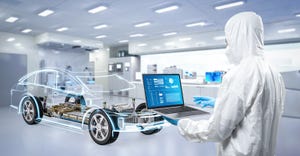Natron Energy: Pioneering US Sodium-Ion Battery Production Facility
Natron Energy's pioneering sodium-ion battery facility in Holland, MI, reshapes the US energy landscape and marks a pivotal moment in energy storage.

The inauguration of commercial-scale operations at Natron Energy's sodium-ion battery manufacturing facility in Holland, MI, indicates a significant positive shift in the US battery supply chain landscape. This announcement marks a milestone as Natron Energy becomes the first-ever producer of sodium-ion batteries at a commercial scale in the US. The implications of this achievement echo through various sectors and embody a transformative step forward for the country's energy storage capabilities.
Sodium-ion batteries benefits
Sodium-ion batteries offer many advantages over conventional lithium-ion batteries, and the sodium-ion battery market is expected to reach $5B by 2030. With higher power density, faster recharge rates, longer life cycles, and better safety features, they provide a compelling alternative for diverse applications, ranging from data centers to industrial mobility and electric vehicle (EV) fast-charging.
Driving economic growth and innovation in Michigan
By establishing a manufacturing facility in the US, the company reduces reliance on imported battery technologies, thereby enhancing national energy security and resilience. This move not only bolsters the local economy but also creates high-quality clean energy jobs in Michigan, fostering economic growth and prosperity in the region. Colin Wessells, founder and co-CEO of Natron Energy, stated, “The electrification of our economy is dependent on the development and production of new, innovative energy storage solutions. We at Natron are proud to deliver such a battery without the use of conflict minerals or materials with questionable environmental impacts.”

Natron Energy's critical power battery. Courtesy of Business Wire.
Furthermore, Natron Energy's more than $40M investment in upgrading the manufacturing facility and converting existing lithium-ion battery lines to sodium-ion production underscores a commitment to innovation and sustainability. The support from Advanced Research Projects Agency-Energy (ARPA-E), through programs like SCALEUP, highlights the strategic importance of Natron's endeavors in advancing energy technologies with untapped potential.
“Today, we celebrate a factory that can fundamentally change industrial power and tackle domestic supply chains, and make the US the world leader in sodium-ion battery technology,” stated ARPA-E Director Evelyn N. Wang. This collaboration not only accelerates Natron's technology commercialization but also demonstrates a concerted effort toward achieving national energy goals.
Another worthy aspect of this announcement is the environmental and social responsibility embedded in its supply chain. By utilizing commodity materials such as aluminum, iron, manganese, and sodium electrolyte, Natron's batteries avoid the use of conflict minerals and materials with questionable environmental impacts.
Also, the scalability of Natron's manufacturing facility and its projected production capacity of 600MW signify a promising future for sodium-ion battery technology in the US. Natron Energy's milestone achievement not only marks a significant advancement in sodium-ion battery technology but also holds promise for revolutionizing the US battery supply chain, driving economic growth, fostering innovation, and advancing sustainability efforts nationally. Several companies are developing this technology; therefore, expect more advancements in sodium-ion battery technology.
About the Author(s)
You May Also Like





